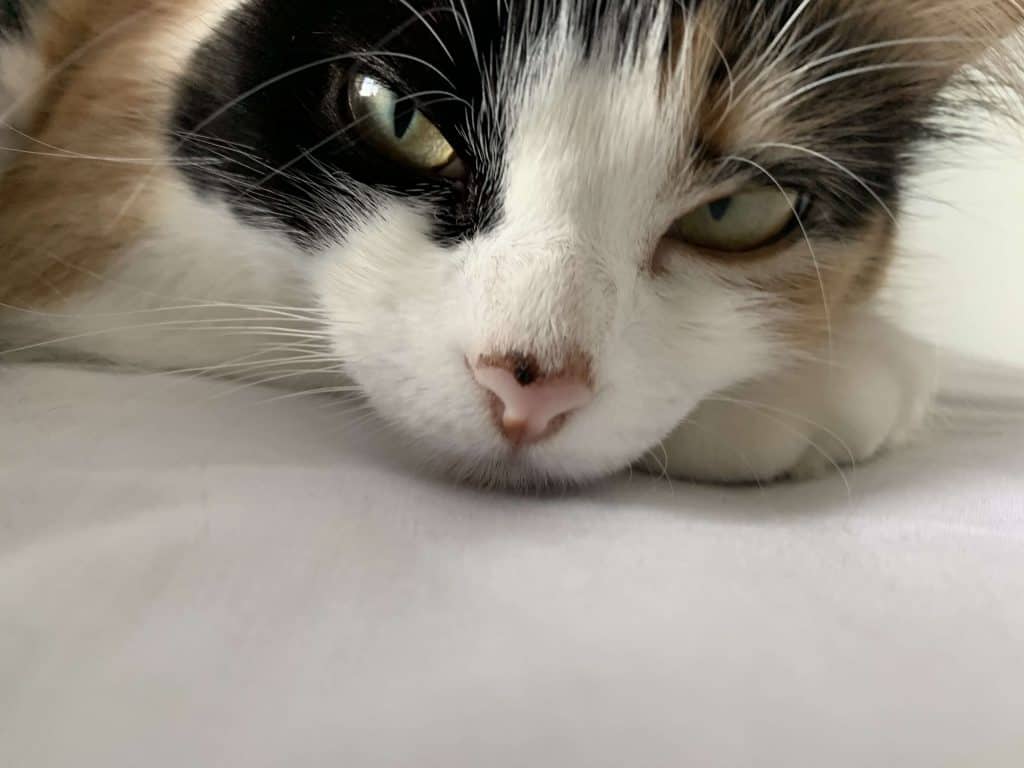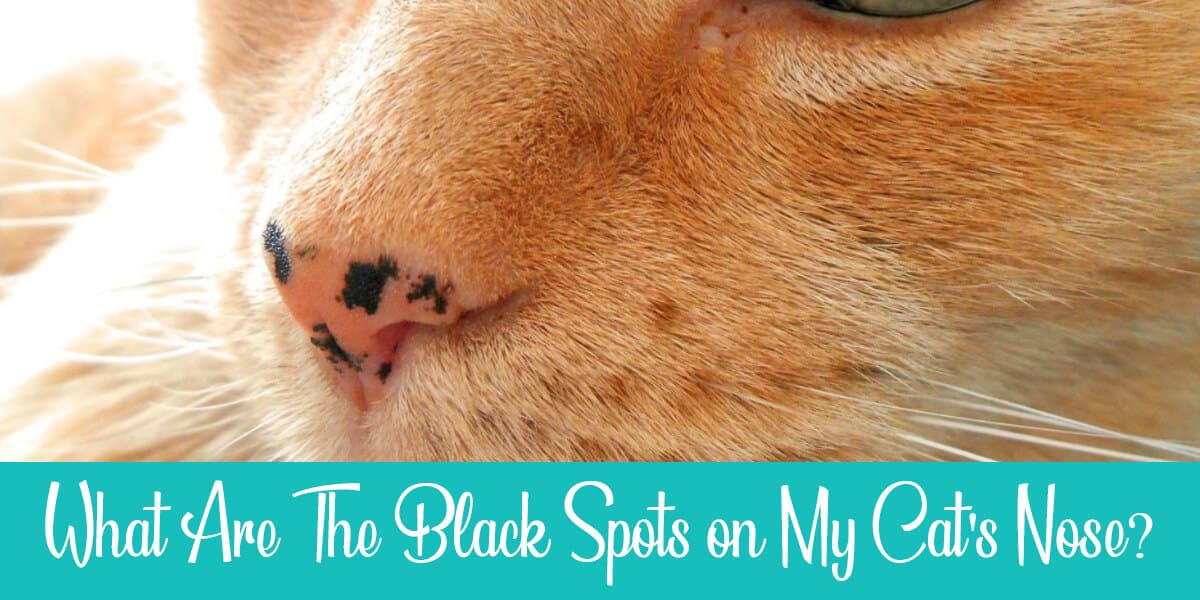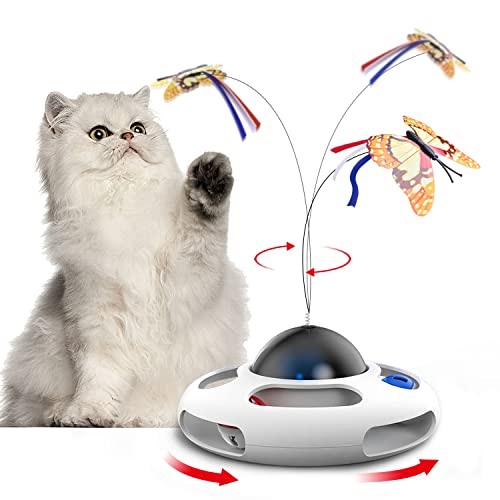We’re called “pet parents” for a reason. We love them like our children, and the responsibility for their well-being burdens us. That genuine care is what probably got you here.
The black crust on a cat’s nose is a common concern for many cat breeders. This article will list the various factors behind this symptom. We’ll also guide you to some practical steps to take and the best preventative health practices.
Table of Contents
Is Black Crust on Cat Nose a Serious Health Concern?
Frequently, the dark crust is hardened nasal secretions (boogers) resulting from a viral infection (usually feline herpes) or other manageable respiratory infections. In many cases, wiping the nose regularly is the only needed treatment.
Other less severe conditions are related to skin issues like dry skin or lentigo. However, the dark crust can also indicate more severe health issues like melanoma.
Less Serious Causes of Black Crust
The black crust can be caused by simple daily incidents that can easily skip your attention. No worries here, the treatment is pretty straightforward.
Dark Material or Dirt
Dry food and material from dark carpets, pet toys, or clothing can stick to your cat’s nose. Frequently vacuum your carpets and keep the cats away from clothes that shed lint.
Scratches
You might notice a black crust after your cat gets hurt during violent play. The blood from a scratch inside the nose can harden, forming the crust. Watch your cat carefully; if the nose turns red or swells, take the cat to a vet to ensure it doesn’t get infected.
Diseases Causing Black Crust

The black crust can be an indication of a minor respiratory infection or more severe health diseases.
Lentigo
If you note black spots on both the mouth and the nose, it’s more likely lentigo. This skin condition is common among cats. Flat black or brown spots show up on gums, eye margins, nose, and lips (facial mucocutaneous junctions).
The dark spots are widespread among yellow, calico, tortoiseshell, orange, and flame point cats. Those breeds have a high number of epidermal melanocytes (cells producing pigmentation), causing hyperpigmentation.
Lentigo first appears on the lips and can later spread to the gums, eyes, and nose. They start small and grow with age.
Is Lentigo a Serious Condition?
You don’t need to worry about lentigo. It’s only discoloration of the skin. Like freckles in humans, it’s completely harmless and normal.
Although they will never grow to become cancer, a vet should periodically check lentigo spots to make sure they are not masking melanoma (cancerous) spots. Raised spots tend to be cancerous more than flat spots.
Causes of Lentigo
Lentigo is passed down through genes. Human freckles are linked to being exposed to the sun. However, research hasn’t found a link between lentigo and other factors.
Treatment of Lentigo
Lentigo requires no medical treatment like freckles. Just embrace the natural beauty of your cat.
Diagnosis of Lentigo
Vets diagnose lentigo by physically examining the cat. Your vet might inspect suspected cancerous spots more thoroughly by taking a sample and viewing it under a microscope.
Melanoma
People can get melanoma due to being exposed to sunlight for prolonged periods. However, this is rarely the case for cats. Melanoma is linked to melanin, the pigment produced by specific body cells.
Infectious forms of melanoma can quickly spread to the skin, mouth, and eyes. Severe complications like difficulty breathing, weight loss, and lacking appetite can result from the fast spread of cancer to the liver and lungs.
Respiratory Infections
A cat’s nose produces nasal discharge as a protective measure, much like the human mucus in the respiratory tract. When it dries out, it forms removable boogers. You need to determine the cause of those secretions to ensure you’re not skipping a warning sign.
The discharge can indicate a mild infection or cold. However, if the discharge has a black, dark brown, or bloody color, it could indicate a blood issue.
Nasal Discharge Symptoms
- Polyps
- Teeth discoloration
- Swelling of the face
- Breathing difficulties
- Eye inflammation
Here are some common respiratory infection symptoms you should know about.
Nasal Discharge Causes
- Vomiting
- Infections due to fungus
- Infections from viruses
- Infections from bacteria
- Inflammation of the ear
Herpes
Feline herpes viruses are common culprits behind upper respiratory infections experienced by cats. They can remain in dormancy along a nerve in the body and get activated periodically, sometimes as a reaction to stressful conditions. Most cats will catch this virus sometime in their life.
Is Herpes a Serious Illness?
Herpes is highly contagious, but you don’t need to worry because humans can’t catch herpes from cats.
Herpes Symptoms
- Congestion
- Eye lesions
- Unusual sneezing
- Nose and eye discharge
- Eyelid inflammation (conjunctivitis)
- Ulcers of the eye
- Drooling
- Lost appetite
- Fever
- Squinting
- Depression
- Lethargy
Causes of Herpes
Herpes is common among cats brought from grouped shelters or households. The virus is caught by cats from other cats through direct contact in numerous ways:
- Grooming together
- Nose, mouth, or eye discharge of other cats
- Shared food and water dishes
- Shared litter boxes
- Kittens can catch the virus in the womb from their mother
- Stressful environments cause flare-ups of the illness
Treatment of Herpes
Most cats won’t entirely get rid of the herpes virus. Medical treatments are only prescribed to relieve the symptoms. Antibiotics don’t cure viruses but protect the cat from developing secondary bacterial infections due to weakness.
Along with good nutrition and emotional care, the following medicines can help many cats recover successfully.
- Drops or cream for eye inflammation or conjunctivitis
- Antiviral medications
- Oral antibiotics (you can add them to cat food)
On your side, you can try to comfort your cat till it gets through this illness:
- Regularly clean your cat’s infected eyes to avoid hardening of the discharge
- Wipe your cat’s nose frequently
- Create a steamy place to relieve the congestion
- Ensure that your cat eats and drinks regularly
How to Clean a Cat’s Nose?
Cats would resist close contact with their faces. The skin on their nose is sensitive, so be gentle and choose a soft cloth or cotton. Don’t try to clean the inside of the nose.
Dip the cloth (or cotton ball) in warm water and wipe the nose. You can hold the cat in a towel or blanket to avoid scratches. Do this regular cleaning at least once a week to relieve your cat from the discomfort of hardened discharge.
Herpes Prevention
- Vaccinate your cat
- Isolate infected cats from other cats
- Maintain a stress-free environment
When to Consult a Vet?
We recommend that you consult a vet immediately if you notice any of the following signs. Consider online consultations if you can’t pay a timely visit.
Herpes and Respiratory Infections
- Cat discharge (boogers) are common, but if you realize the following changes, ask an experienced vet as soon as possible.
- More frequent nasal secretions
- A change in the color of discharge
- Raspy/ difficult breathing
- The cat sits in a hunched position
- Lethargy
- Cat is not as energetic as usual
- Higher ears temperature due to fever
- Cat quits eating for more than 24 hours
Lentigo and Melanoma
- If you notice a widespread of spots
- If the spots are raised (not flat)
- If a spot becomes tender to touch
- If a spot changes in size
How to Boost Cat Immunity Naturally?
The best prevention (and cure) against viral infections (like herpes) and autoimmune diseases (like melanoma) is to have strong immunity. Below is a list of natural ways to achieve that goal for your cat.
Exercise
Besides entertaining the cats and helping them lose extra weight, exercise helps reduce stress. Stress severely affects the immune system. It’s also a primary culprit behind herpes.
Diet
Many types of store-bought pet food are loaded with harmful chemical components, preservatives, by-products, and fillers. If your cats have low-quality food, they are deprived of essential nutrients, making them less immune to diseases. Instead, choose pet food high in nutritional contents like minerals, vitamins, antioxidants, and micronutrients.
Supplements from herbs: You can give supplements to cats at the beginning of a minor sickness to help them recover sooner. Also, add those supplements to their daily food to boost the immune system in the long run. Consult your vet for choosing a supplement and determining a suitable dose.
Probiotics
Like humans, cats’ health starts with gut health. The microbiome is a complex culture of bacteria and yeasts in the small intestine.
This system of minute organisms is negatively affected by antibiotics, poor diet, and stressful conditions. The cat may suffer from chronic digestive disorders like diarrhea and gases if this balance is disrupted. More importantly, your cat’s immune system will be strongly affected.
You can reintroduce friendly bacteria to your cat’s gut with a probiotic supplement. This will compensate for what has been lost if antibiotics have been taken for a severe illness. A regular probiotic intake will generally boost the immunity system.
Omega-3
Inflammation is a normal reaction from the immune system. However, long-lasting inflammation is a common cause of significant health issues. It also indicates weak immunity.
Give your cat supplements of omega-3 fatty acids to overcome prolonged inflammation and prevent severe potential illness.
Summary
Manageable health conditions usually cause the black crust on cat nose. It might just be an issue of cleanliness. However, melanoma and herpes complications demand a sooner intervention by the vet. Invest money, time, effort, and emotions in your cats because they rely on your caretaking.

I’ve been living with cats since 2008 and I can confidently say I have more feline friends than humans lol. I currently live with 5 cats in different life stages; two of them are less than one year old, one is 2-ish years old and the oldest two are 9-ish years old. I’ve developed a strong bond with cats over the years and I’m eager to share my experience through this blog. You can learn more about my cats here.



